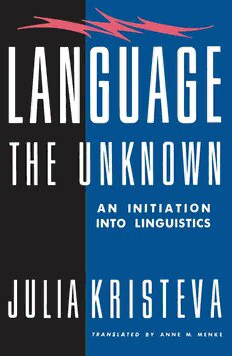
Language: The Unknown PDF
Preview Language: The Unknown
LANGUAGE: THE UNKNOWN European Perspectives A Series of the Columbia University Press LANGUAGE THE UNKNOWN An Initiation into Linguistics JULIA KRISTEVA /I Translated by Anne M. Menke COLUMBIA UNIVERSITY PRESS NEW YORK Columbia U niversicy Press wishes co express its appreciation of assistance given by the government of France through le Miniscere de la Culture in the preparation of chis translation. COLUMBIA UNIVERSITY PRESS NEW YORK Le langage, cet inconnu, copyright © Editions du Seuil 1981; translation copyright © Columbia University Press 1989 All rights reserved Library of Congress Cataloging-in-Publication Data Krisceva, Julia, 1941- (Langage, cet inconnu. English} Language-the unknown : an initiation into linguistics / Julia Krisceva ; translated by Anne M. Menke. p. cm. -(European perspectives) Translation of: Le langage, cet inconnu. Bibliography: p. Includes index. ISBN 0-231-06106-4 (alk. paper) 1. Linguistics. 2. Language and languages. I. Title. II. Series. Pl21.K7413 1989 410-dc19 88-39195 CIP Printed in the United States of America Case bound editions of Columbia University Press books are Smyth-sewn and printed on permanent and durable acid-free paper CONTENTS PART ONE: INTRODUCTION TO LINGUISTICS Introduction 3 1. Language, La Langue, Speech, and Discourse 6 2. The Linguistic Sign 12 3. The Materiality of Language 18 Phonetics 19 The Graphic and the Gestural 23 Linguistic Categories and Relations 30 PART TWO: LANGUAGE IN HISTORY Introduction 43 4. Anthropology and Linguistics: The Knowledge of Language in So-Called Primitive Societies 48 5. The Egyptians: Their Writing 63 6. Mesopotamian Civilization: The Sumerians and Akkadians 68 7. China: Writing as Science 72 8. Indian Linguistics 82 9. The Phoenician Alphabet 93 10. The Hebrews: The Bible and the Cabala 98 11. Logical Greece 104 V Contents vi 12. Rome: The Transmission of Greek Grammar 117 13. Arab Grammar 129 14. Medieval Speculations 135 15. Humanists and Grammarians of the Renaissance 144 16. The Grammar of Port-Royal 158 1 7. The Encyclopedie: La Langue and Nature 172 18. Language as History 193 19. Structural Linguistics 217 Logical Research 221 The Prague Linguistic Circle 223 The Copenhagen Circle 230 American Structuralism 237 Mathematical Linguistics 249 Generative Grammar 252 PART THREE: LANGUAGE AND LANGUAGES 20. Psychoanalysis and Language 265 21. The Practice of Language 278 Orators and Rhetors 279 Literature 287 22. Semiotics 295 Structural Anthropology 299 The Language of Gestures 303 Musical Language 308 Visible Language: Painting 312 Visible language: Photography and Cinema 315 Zoo semiotics 318 CONCLUSION 325 NOTES 331 WORKS PRINCIPALLY RELIED ON 341 INDEX 343 Where does one start an initiation into linguistics? This book will answer that question, one every student of language, the humanities, and the social sciences has asked himself. This book is more than just a manual; it begins by retracing the history of the study of language as it developed in many different civilizations. The center of interest is the science of language in the West, with an emphasis on today's sciences. Proceeding in this way shows linguistic thought to be closely linked to philosophy and to society. Beyond the technical quarrels among the various schools, linguistic thought appears basically recep tive to the adventure of man in his encounter with meaning and societies. If it is true that the era of humanism is followed by something, as yet unknown, is it not indispensable to approach this unknown through language, which is and will always remain more unknown than man, and coextensive with his being? This justifies, it seems to me, a new edition of a book written a dozen years ago, for the questions addressed then are still relevant today. J. K. LANGUAGE: THE UNKNOWN
